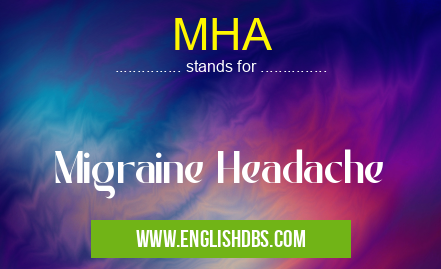What does MHA mean in DISEASES
MHA stands for Migraine Headache and is a form of a headache disorder that can cause intense throbbing pain in the head and other symptoms like nausea, vomiting, and extreme sensitivity to light and sound. MHA affects about 1 in 10 people globally. It usually begins in childhood or early adulthood, but it can occur at any age. It is more common in women than men. MHA is typically caused by changes in the brain, including chemical imbalances, genetic factors, environmental factors, or a combination of these. Treatment of MHA usually includes lifestyle changes such as diet and stress management, pharmacological treatments such as medications, Botox injections or nerve block procedures.

MHA meaning in Diseases in Medical
MHA mostly used in an acronym Diseases in Category Medical that means Migraine Headache
Shorthand: MHA,
Full Form: Migraine Headache
For more information of "Migraine Headache", see the section below.
Essential Questions and Answers on Migraine Headache in "MEDICAL»DISEASES"
What is a migraine headache?
A migraine headache is a type of severe headache that typically causes an intense throbbing or pulsating pain on one or both sides of the head, and often accompanied by nausea, vomiting, sensitivity to light and/or sound.
How common are migraine headaches?
Migraine headaches are quite common, affecting approximately 12% of all adults in the United States.
Are there any known risk factors for developing migraines?
Yes, some potential risk factors for developing migraines include increased age, gender (being female), family history of migraines, stress levels, poor diet, drinks containing caffeine and alcohol, lack of sleep and certain types of medication.
What kind of symptoms do most people experience when they have a migraine headache?
Most people tend to experience severe throbbing or pulsating pain on one side of the head when having a migraine. Other common symptoms may include nausea, vomiting, sensitivity to light and/or sound and fatigue.
Are there any lifestyle changes I can make to help reduce the risk of getting migraines?
Yes! There are many lifestyle changes you can make that may help reduce your risk for getting migraines. Some recommendations include avoiding triggers such as certain foods and drinks including caffeine and alcohol; managing stress levels; establishing healthy sleeping habits; eating more nutritious meals; exercising regularly; staying hydrated; avoiding bright lights and noise when possible.
Are there any medications available that can prevent migraines?
Yes! There are several medications available which have been approved by the FDA for prevention of migraines. These include beta-blockers such as propranolol, calcium channel blockers such as flunarizine or verapamil; botox injections; tricyclic antidepressants like amitriptyline and serotonin 5-HT1 agonists such as sumatriptan. It’s important to consult with your physician before starting any new treatment plan.
Is it possible to treat a migraine without taking medication?
Yes! While medications are often prescribed for treating migraines, there are also several non-medication treatments available which may provide relief from migraine symptoms. Some examples include applying cold compresses or using a heat pack or hot water bottle on the affected area of the head; practicing relaxation techniques such as yoga or meditation; massage therapy; acupuncture and biofeedback exercises.
Is it safe to take over-the-counter drugs for treating my migraine headaches?
Generally speaking it is best to consult with your doctor before taking any sort of OTC medication for treating headaches in general - including migraines - as some contain ingredients (such as ibuprofen) which could potentially worsen the effects if taken too frequently. Your physician will be able to recommend which medicines would be most suitable based on your individual health needs.
Can anything be done if my migraines become frequent or chronic?
If you have been experiencing frequent or chronic migraines (>15 days per month) then it is important to speak to your doctor so they can develop an individualized treatment plan tailored specially for you based on the frequency and intensity of your symptoms. This may involve lifestyle changes in conjunction with preventive medications.
Final Words:
MHA stands for Migraine Headache which affects 1 out of 10 people around the world regardless of their age or gender although it’s more common in women compared to men. The causes are varied ranging from brain chemistry changes to hereditary factors to environmental factors but its effective treatment involves both lifestyle modifications along with medications based on individual needs and suitability.
MHA also stands for: |
|
| All stands for MHA |
